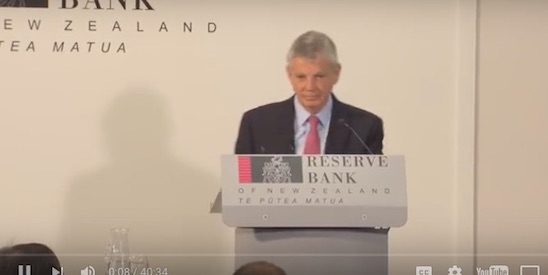Accounting & Finance
Did New Zealand invent the Banking System?
Ages ago, I was having coffee with a friend of mine (not a hugely unusual occurrence it has to be said), and we were discussing Banks in New Zealand.

Ages ago, I was having coffee with a friend of mine (not a hugely unusual occurrence it has to be said), and we were discussing Banks in New Zealand. Now most people know that I don’t really think they are that great. And I have always found it odd that by and large Kiwis think their banking system is the bee’s knees. You will find this especially at Immigration Expos – where I remember them telling us how much more advanced than the UK banking system it was.
But I was gobsmacked when my friend told me that while talking to a Kiwi, she was told that New Zealand had in fact actually INVENTED the banking system.
So, who did invent the banking system? I always thought it was the Templars, with their vast sums of money and preceptories throughout Europe and the Middle east, which allowed people to deposit money in one country, and withdraw it in another using a promissory note – sort of like a Mediaeval Travellers cheque.
Well, according to Wikipedia – that fount of a million things you never knew you needed to know – banking has been around in its simplest form since about 3000 BC. Ancient Babylon developed loans and the Greeks had a system for allowing deposits in one city to be removed in another city. The first individual banker recorded in history is a guy called Pythius, at the beginning of the 5th century B.C In the Aegean, the island of Delos became a centre for banking in the region in 300 BC.
It all went horribly wrong with the Romans: they did well with the administration of banking, and improved the charging and payment of interest, but they liked Cash too much, so banking didn’t work out so well for them.
Banking didn’t come back to Europe till the Crusades, in about 1100 AD. And yes – the Templars did help out a bit J. In the 13th and 14th century – it gets a bit messy – with the papal banks and Italian merchants fighting it out as to who had the best banks at the time, and an English King or two defaulting on loans!
(See its not just the Hoi Polloi who have money worries and can’t pay their debts – the whole downfall of the Templars was due to the king of France running out of money to fund a new war. How about that for a Financial Crisis! “I need some money – I know – let’s torture some Knights for a few years, burn em at the stake and nick their treasury!”)
Essentially at this point – the Italian merchants get into Banking, and in the 15th century in Florence it becomes legal to charge interest (prior to this it was illegal and called Usury).
In the UK funnily enough, banking seems to have started in coffee houses, with the royal exchange opening in 1565.
So there you have it. Whether or not you love or loath the New Zealand banks – they defiantly cannot claim to have invented banking.
Accounting & Finance
Low Interest Rates Winners and Losers

Lower mortgage interest rates is a big deal for most homeowners and buyers.
Existing homeowners can hunt around for a better deal with the same or another lender and in the process save hundreds, if not thousands of dollars on interest payments. Even if a borrower is locked into a fixed rate deal on a fixed term, it often pays to break it and reap the rewards of paying a lot less interest.
For first time home buyers, lower interest rates can be the difference between renting and owning a home. Existing homeowners trading up or down, see lower interest rates as a great time to sell and buy too, Therefore there is always a frenzy of activity in the mortgages sector when there is movement in interest rates and there will be winners and and there will be losers.
Winners and Losers
Lower interest rates sends a signal to vendors with homes to sell, that there are more buyers in the market. This can get unsold properties sold which is a win win for vendor and buyer.
More buyers in the market, however can also push the sales price up, as vendors aim to get the best price and there can be only one buyer, the one who is willing and able to pay the most.
In this situation it’s more of a win for the vendor. The eventual purchaser is likely to have paid more than they were comfortable with and thus borrowed more to get the property. Plus there were many buyers locked out by the higher price.
First Home Buyer Tip
The tip for first home buyers is to always be ready to take action as soon as the timing is right.
For first home buyers, it’s always a good time keep a financial advisor or broker up to speed on your personal financial position. This way when the timing is right, like a downward move in interest rates, you can just ask the question:
“What can I afford to borrow, now the interest rates are lower?”
There is no such thing as one size fits all when it comes to borrowing money. Your position will determine how high risk you are to a lender.
A trusted advisor in the know, can act fast on your behalf when lending conditions favour you. Lenders who see you a good ‘investment’ will be keen to move quickly too, to secure your business and thus beat their competition, i.e. other lenders.
Recent news of an OCR rate drop by the RBNZ, spread like wildfire around the country and the early worm is sure to get the best deals.
Homeowners with advisors already up to speed on their current position, will be busy acting on their behalf, to find the best deal saving their clients hundreds if not thousands in interest repayments over the term of their loan.
Property price increases have cooled in Auckland, increasing by just 1.7 percent compared to the previous year. Listings too have been lower, however that’s all about to change. More buyers, trigger more listings and with more buying power, higher property prices.
Timing is everything, so whatever your circumstance, talk to your mortgage advisor and act on the deal that’s right for you.
Accounting & Finance
Property Listings Drought Adds Fuel To Fire
A property listings drought is adding further fuel to our over-heated property market. Property prices are increasing everywhere except Taranaki according to Trade Me Sales Price Index and that’s got the RBNZ considering further action to curb demand.

A property listings drought is adding further fuel to our over-heated property market. Property prices are increasing everywhere except Taranaki according to Trade Me Sales Price Index and that’s got the RBNZ considering further action to curb demand.
The RBNZ’s LVR restriction on Auckland property investors has done little to dampen their appetite and many have also moved their focus to other areas where property prices have been on the increase since October 2015.
The listings drought suggests most home owners are electing to improve their properties using the equity in their homes over moving house. Some Aucklanders have chosen to leave the city for change of lifestyle and Tauranga has been one of the main benefactors as well as the region of Hawkes Bay.
Curbing demand is how the RBNZ want to deal with the property market and they’re considering a variety of measures. Bernard Hickey in a news item on NZHerald believes we’ll know more on the RBNZ’s next move in the second half of 2016. Bernard mentions two dates in particular: 19 August is the deadline for Auckland Council to accept all or some or reject all the Unitary Plan. The Government is hinting at wading in if the Unitary Plan does not meet their goals of an Auckland growing up and out to meet new housing supply targets.
The other date to watch out for is 30 November. On this day the RBNZ presents it’s Financial Stability Report. One of the measures under consideration by the RBNZ is the fixing of the income to loan ratio.
From the news item on NZHerald
“The Reserve Bank helpfully included a chart in this week’s report that showed around 35 per cent of owner-occupiers and 60 per cent of investors had borrowed more than 5 times their income.”
New rules are coming and if what’s happened to date is anything to go by the RBNZ is not shy at taking action so keep these dates in your diary. No doubt investors are now very aware of their income to lending ratio and will be taken the necessary steps to survive the next round of RBNZ restrictions.
This blog article was written for PropertyBlogs by Mobilize Mail.
Accounting & Finance
How Low Can Mortgage Rates Go?
News of lower wholesale interest rates suggests we may be in for another round of super low home loan interest rates as early as next week. A news item on interest.co.nz provides examples of the correlation between swap rates and the mortgage rates with one example being SBS Bank’s one year rate as it was back in November 2015.

News of lower wholesale interest rates suggests we may be in for another round of super low home loan interest rates as early as next week. A news item on interest.co.nz provides examples of the correlation between swap rates and the mortgage rates with one example being SBS Bank’s one year rate as it was back in November 2015. At the time their rate was big news as it was the lowest at 3.99% while the one year swap rate was at 2.72%.
Fast forward to February 2016 and SBS Bank’s one year rate is at 4.35% while the one year swap rate is currently lower than it was back in November, its currently 2.58%. A downwards move is predicted and SBS Bank could move back to where it was in November 2015 at 3.99% or go even lower.
It really just takes one lender to make a move and the other lenders are sure to follow. Borrowers in the know are regularly speaking to their mortgage broker to keep up to speed on the best deals and terms on offer.
So how low can mortgage rates go? Possibly lower than they were in 2015.
This blog article was written for PropertyBlogs by Mobilize Mail.
-

 Management5 years ago
Management5 years agoHome Insulation Requirements
-

 Investment5 years ago
Investment5 years agoAnother date NZ property investors are dreading
-

 Accounting & Finance5 years ago
Accounting & Finance5 years agoLow Interest Rates Winners and Losers
-

 Build5 years ago
Build5 years agoHow to Choose and Purchase a Suitable Property to Subdivide
-

 Management6 years ago
Management6 years agoAttracting More Business Travellers To Your Auckland Airbnb Property
-

 Investment6 years ago
Investment6 years agoWould You Be a Landlord in 2018?
-

 Tenants6 years ago
Tenants6 years agoCoworking Countdown – 4 Things to Prepare Before You Move In
-

 Renovations6 years ago
Renovations6 years agoFive easy steps to boost the appeal of your home
